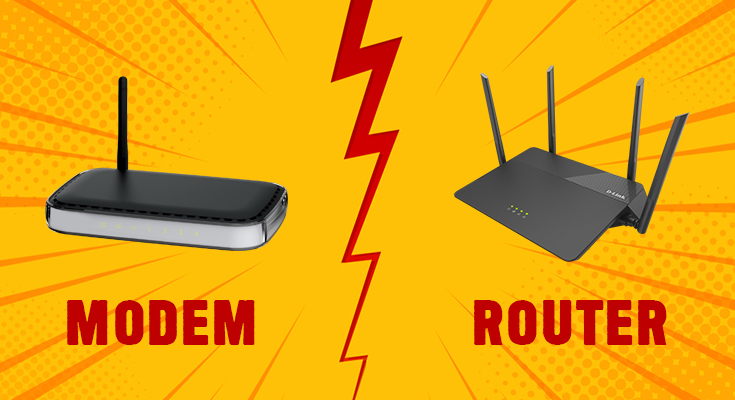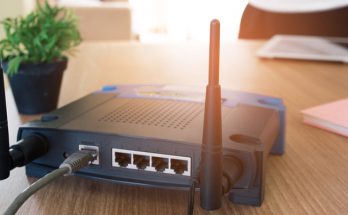Setting up your home network connection sounds easy, but when you start doing it, you can get confused easily. Sometimes it seems like you need to be a technician in order to understand how to set up your home network. When you go through the home setup of your network you must have thought to yourself “is separate modem & router really necessary?”
In earlier days of wireless internet connection technology, you had to use both Modem & Router for getting connected to the Internet. WiFi Modem Router is essential if you wish to get connected to your local internet service provider. But with technological advancement, internet service providers merged these devices into one powerful device known as the WiFi gateway. Read below to understand what is an Internet modem? What is a WiFi router? What is a gateway? And how to know which one is better.
What is an Internet Modem?
A modem (modulator-demodulator) is a physical device that connects devices to the Internet via broadband connections. A modem receives signals and translates it. The modem can only connect to one device at a time. That’s why a modem is connected to a WiFi router, which helps multiple devices connect to the Internet.
What is a Router?
A router is a physical device that connects the modem to all network devices, such as Smartphones, Tablets, and Desktop. Most of the time, your router would connect to the internet modem via a yellow cable (Ethernet Cord). Sometimes routers connect to the modem via wireless networks. Nowadays, you get WiFi Routers that can be connected to the Internet modem through both ways.
Do you need both Modem and Router?
One thing you should know before setting up your home internet connection. Both Internet Modem and WiFi router play different roles in connecting your home to your high-speed internet connection. So just using either one won’t work. If there is no Internet modem, then your devices won’t be able to connect to the signal transmitted by your local ISP. If there is no WiFi Router, then your devices won’t be able to connect to the translated signal, as there is no connection available in between your modem and router.
What is a WiFi Gateway?
A WiFi Gateway is a physical device that is a Modem-router combo. Basically, this one single powerful device can do the work of both the WiFi Router and the Internet Modem. The benefit of getting a WiFi gateway is that you can save both space and hassle of two devices. The downfall, however, is that is one part of the device stops working then it’s useless. Unlike a separate modem and router, you can change whatever part is causing the trouble. But when both the devices are merged into one, you must get a whole new gateway altogether.
Gateway vs. Modem vs. Router
The main difference between a Modem and Router and Gateway is that when you use separate modem and router, you have two devices working to connect your home to the internet. With the WiFi gateway, there is just one device and fewer cables. Using a separate modem and router and using a WiFi gateway both have their own set of pros and cons.
Pros of a Separate Modem and Router
- More settings and customization options are available. Like IP address reconfiguration, Firmware, and boosting transmission power.
- Easy to upgrade to a better device if you wish for better connectivity. You can choose to change either the modem or router.
- More affordable to replace a device when it is no longer functioning.
- Improved security features
- Better flexibility and control over your home network.
Cons of a Separate Modem and Router
- Two different devices require a lot of space and require a lot of technical adjustments.
- Require multiple outlets and cables.
- Requires above basic technical knowledge to set up your home network.
Pros of a WiFi Gateway
- A single piece of hardware requires less space, just one outlet, and fewer cables.
- Basic troubleshooting with a single company.
- Simpler and easier setup than two separate devices
- Most gateways are from the service provider, so you have in-built customer support.
Cons of a WiFi Gateway
- Difficult to upgrade
- Difficulty diagnosing the problem and troubleshooting it
- Costlier to replace than an individual modem or router.
Conclusion
So if your home does not lack space, then you should definitely go with a Separate Modem and Router. It is much easier to upgrade and if you ever face any trouble with your Internet connection, then it is much easier to figure out which device is the cause for the network trouble. Choosing the right internet modem and WiFi router is probably the better choice. However, if you lack space and don’t wish for two devices to sit in a corner of your living room, then WiFi Gateway is probably the better choice. Plus, you get in-built customer service with your WiFi Gateway. Still, if it was up to us, we would recommend you to get a separate Internet Modem and router for your internet connection.





Great content! Super high-quality! Keep it up! 🙂